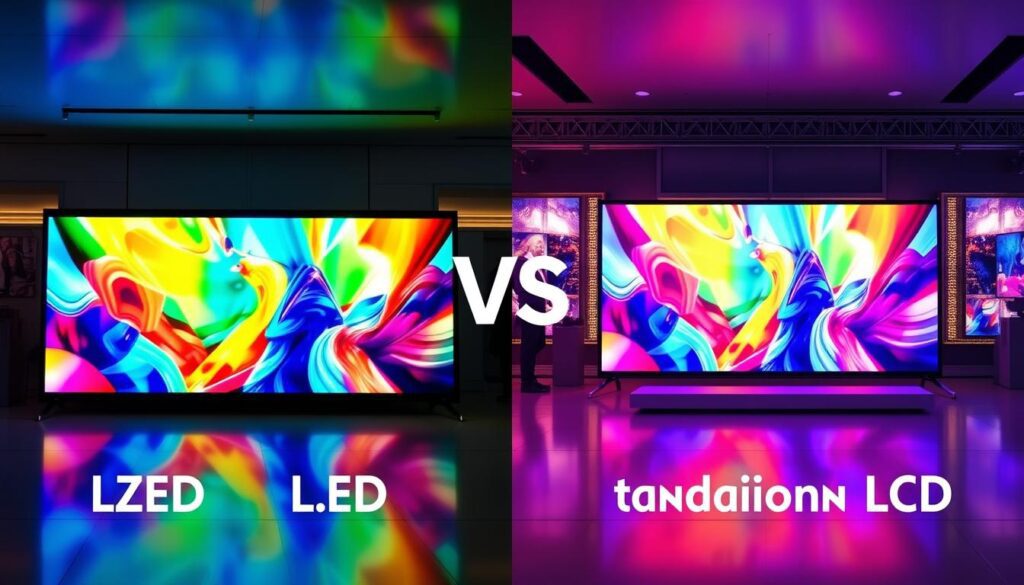Both LED and LCD panels are available when you’re searching for a new display. Although they operate differently, they both provide excellent images. Recognizing the differences is necessary to choose the ideal choice for you.
As screens get better, It’s very important to recognize their benefits and drawbacks. The basics of LCD and LED screens will be discussed in this essay. We’ll look at their primary differences and factors to consider when selecting one, such as in contrast to LCD and LED.
Gaining knowledge about LCD and LED screens can help you make a better decision. This article can assist you whether you need a new phone, TV, or computer monitor. It will guide you through the LED and LCD screen world.
Important Takeaways
- LED and LCD screens offer different performance and technology.
- Identifying the differences between led vs lcd screen, led vs lcd comparison, and led vs lcd display is required in order to make an well-informed decision.
- LED screens are notable for their prompt action times and outstanding ratios of contrast.
- Wide-ranging viewing angles and outstanding brightness are qualities of LCD screens.
- The led vs lcd comparison can assist you in choosing the ideal screen for your conditions.
- Taking into account variables like display brightness, color accuracy, and power usage is important when selecting between LED and LCD screens.
Understanding the Basics of Screen Technology
Choosing between led vs lcd technology starts with knowing the basics. LCDs block or allow light to pass across pixels using liquid crystals. However, liquid crystals are made thinner and more energy-efficient by using LEDs to light them up.
Both types have backlights, polarizers, and color filters. LCDs often use CCFL backlights, while LEDs use white LEDs. This affects brightness and color, making it key to compare led vs lcd monitors.
Knowing the differences between led and lcd is crucial for buying a display. Consider brightness, color accuracy, and power use. This helps you pick the right display, whether for gaming or everyday use.
What is LCD Technology?
LCDs use liquid crystals to control light through pixels. They’re found in many devices, from phones to TVs.
What is LED Technology?
LEDs, by contrast, use LEDs to light up liquid crystals. This makes them more energy-efficient and thinner, appealing to many.
Core Components of Both Display Types
Both LCD and LED displays have backlights, polarizers, and color filters. Knowing how these work together helps understand the led vs lcd differences. This knowledge aids in choosing the right display.
LED vs LCD Screen: A Complete Comparison
Choosing between led vs lcd screen technologies involves several factors. A detailed led vs lcd comparison is key to making a smart choice. Look closely at the display quality of led vs lcd display options.
led vs lcd screen technologies differ in display quality, power use, and lifespan. LED screens usually have better contrast and color. LCD screens, however, are more budget-friendly.
Important points in the led vs lcd display debate include:
- Display brightness and contrast
- Color accuracy and reproduction
- Response time and refresh rate
- Viewing angles
Understanding these factors helps you decide which technology suits you best. Whether you value display quality, power use, or lifespan, a detailed led vs lcd comparison guides you to the right choice.

Key Performance Factors
Choosing between an led vs lcd monitor or led vs lcd tv involves several key factors. These factors help decide which technology is best for gaming, video editing, or everyday use. The benefits of led over lcd are clear, and knowing these factors helps make a smart choice.
Display quality is key in any screen technology. Response time, color accuracy, viewing angles, and display brightness and contrast are all crucial variables. You can choose which is better for your needs by contrasting these LED and LCD TVs and monitors.
Display Brightness and Contrast
Display brightness and contrast are vital for a great viewing experience. Led screens usually have better brightness and contrast than lcd screens. This makes them perfect for watching in bright rooms, highlighting a major led advantage.
Color Accuracy and Reproduction
Color accuracy and reproduction are crucial for tasks like video editing and graphic design. Led screens often have better color accuracy and reproduction than lcd screens. This makes them a top choice for professionals.
In summary, when picking between an led vs lcd monitor or tv, consider the display quality factors. Understanding these and the led advantages helps make a choice that fits your needs.
Power Consumption and Lifespan
In the process of comparison LEDs with LCDs, It is important to consider power usage and lifespan. LED displays utilize reduced power than LCDs, which advantages both the economy and the surroundings. LEDs ultimately turned into a more economical choice.
The lifespan of LED versus LCD screens is an additional significant factor. LCDs just last approximately 50,000 hours, but LEDs can endure as long as 100,000 hours. Because of this, LEDs finally need less replacements, It results in financial savings. Think about the following important points:
- LED displays often consume less electricity than LCD screens.
- Lifespan: Compared to LCD screens, LED displays often last longer.
- Ownership costs: Because LED displays use less power and extend, they may be less ultimately costly.
In terms of durability and power consumption, LEDs exceed LCDs. However, other factors like as color accuracy and brightness are important. Analyzing the variations between LED and LCD can help you ascertain which the best choice for you.

Based on your necessities, you can select between LED and LCD. Comprehending the led vs lcd display options gives you the option to select the ideal one for your viewing requirements.
| Display Type | Power Consumption | Lifespan |
|---|---|---|
| LED | Lower | Up to 100,000 hours |
| LCD | Higher | Up to 50,000 hours |
Cost Analysis and Value Proposition
Choosing between led vs lcd technology means looking at the cost. The price of an led vs lcd monitor changes with screen size, resolution, and features. Usually, lcd monitors are cheaper, especially for smaller sizes.
But, think about the long-term costs too. Led monitors use less energy, saving you money on bills. Lcd monitors use more power, raising their total cost. To decide, compare the upfront cost with long-term savings.
For long-term use, led monitors might be a smarter choice. They cost more upfront but save energy and last longer. When choosing between led and lcd, think about your needs and budget.
Initial Purchase Price Comparison
- Lcd monitors: generally more affordable for smaller screen sizes
- Led monitors: tend to be more expensive, but offer better energy efficiency and longer lifespan
Long-term Operating Costs
Look at energy use and maintenance costs for both led and lcd monitors. This helps figure out the total cost of owning them.
Conclusion: Making Your Final Choice
Choosing between LED vs LCD screens based on your preferences and needs. Every technology has advantages and disadvantages of its own. So, consider what matters most to you.
LED screens are typically superior if you want the best color, image quality, and wide perspectives. However, LCD screens can be the best option if cost and energy savings are important considerations. To make a decision, consider your watching preferences, your budget, and how you want to utilize it.
You will get excellent performance and value whether you use LCD or LED displays. You have a better understanding of your alternatives thanks to this tutorial. You can now select the display that best suits your requirements.
FAQ
How do LED and LCD screen technologies differ from one another?
The way that LED and LCD panels generate light is different. LCDs illuminate their liquid crystals with a backlight. In contrast, LEDs generate images using individual diodes.
Which type of display LCD or LED has superior quality?
LED screens usually have better quality than LCDs. They provide more realistic colors, greater contrast, and broader viewing angles. Additionally, LEDs respond more quickly, making them ideal for quick films and gaming.
How much power is used LCD and LED screens?
Energy-saving measures is higher with LEDs than with LCDs. They use less power than LCD’s traditional backlights. This makes LEDs better for portable devices and can save on energy bills for TVs.
What is the disparity in price between LCD and LED screens?
Specifically for big screens, LEDs are Often more costly than LCDs. However, because LEDs last longer and use less energy, they might become being less costly in the long term. Cost is also influenced by size, resolution, and additional features.
Which screen technology works best for editing videos or playing games?
For video editing and gaming, LEDs are ideal. They boast greater color, quicker reaction times, and higher refresh rates. These features result in more accurate video editing and a more fluid gaming experience.
In what situations is an LCD screen preferable to an LED screen?
When money is tight or the panel will be in a light area, opt for LCDs. Simple operations like browsing or modifying documents work well with LCDs. For daily use where excellent display quality is not required, they work well.







Your article helped me a lot, is there any more related content? Thanks!